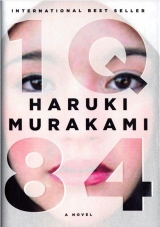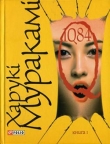
Текст книги "1q84"
Автор книги: Haruki Murakami
Жанр:
Современная проза
сообщить о нарушении
Текущая страница: 15 (всего у книги 81 страниц)
Tamaki lost her virginity in the autumn of her first year in college. The man was one year older than Tamaki, a fellow member of the college tennis club. He invited her to his room after a club party, and there he forced her to have sex with him. Tamaki had liked this man, which was why she had accepted the invitation to his room, but the violence with which he forced her into having sex and his narcissistic, self-centered manner came as a terrible shock. She quit the tennis club and went into a period of depression. The experience left her with a profound feeling of powerlessness. Her appetite disappeared, and she lost fifteen pounds. All she had wanted from the man was a degree of understanding and sympathy. If he had shown a trace of it and had taken the time to prepare her, the mere physical giving of herself to him would have been no great problem. She found it impossible to understand his actions. Why did he have to become so violent? It had been absolutely unnecessary!
Aomame comforted Tamaki and advised her to find a way to punish him, but Tamaki could not agree. Her own carelessness had been a part of it, she said, and it was too late now to lodge any complaints. “I bear some responsibility for going to his room alone,” she said. “All I can do now is forget about it.” But it was painfully clear to Aomame how deeply her friend had been wounded by the incident. This was not about the mere loss of her virginity but rather the sanctity of an individual human being’s soul. No one had the right to invade such sacred precincts with muddy feet. And once it happened, that sense of powerlessness could only keep gnawing away at a person.
Aomame decided to take it upon herself to punish the man. She got his address from Tamaki and went to his apartment carrying a softball bat in a plastic blueprint tube. Tamaki was away for the day in Kanazawa, attending a relative’s memorial service or some such thing, which was a perfect alibi. Aomame checked to be sure the man was not at home. She used a screwdriver and hammer to break the lock on his door. Then she wrapped a towel around the bat several times to dampen the noise and proceeded to smash everything in the apartment that was smashable—the television, the lamps, the clocks, the records, the toaster, the vases: she left nothing whole. She cut the telephone cord with scissors, cracked the spines of all the books and scattered their pages, spread the entire contents of a toothpaste tube and shaving cream canister on the rug, poured Worcestershire sauce on the bed, took notebooks from a drawer and ripped them to pieces, broke every pen and pencil in two, shattered every lightbulb, slashed all the curtains and cushions with a kitchen knife, took scissors to every shirt in the dresser, poured a bottle of ketchup into the underwear and sock drawers, pulled out the refrigerator fuse and threw it out a window, ripped the flapper out of the toilet tank and tore it apart, and crushed the bathtub’s showerhead. The destruction was utterly deliberate and complete. The room looked very much like the recent news photos she had seen of the streets of Beirut after the shelling.
Tamaki was an intelligent girl (with grades in school that Aomame could never hope to match), and in softball she had always been on her toes. Whenever Aomame got herself into a difficult situation on the mound, Tamaki would run over to her, offer her a few quick words of advice, flash her a smile, pat her on the butt with her glove, and go back to her position in the infield. Her view of things was broad, her heart was warm, and she had a good sense of humor. She put a great deal of effort into her schoolwork and could speak with real eloquence. Had she continued with her studies, she would undoubtedly have made a fine lawyer.
In the presence of men, however, Tamaki’s powers of judgment fell totally to pieces. Tamaki liked handsome men. She was a sucker for good looks. As Aomame saw it, this tendency of her friend’s ranked as a sickness. Tamaki could meet men of marvelous character or with superior talents who were eager to woo her, but if their looks did not meet her standards, she was utterly unmoved. For some reason, the ones who aroused her interest were always sweet-faced men with nothing inside. And when it came to men, she would stubbornly resist anything Aomame might have to say. Tamaki was always ready to accept—and even respect—Aomame’s opinions on other matters, but if Aomame criticized her choice of boyfriend, Tamaki simply refused to listen. Aomame eventually gave up trying to advise her. She didn’t want to quarrel with Tamaki and destroy their friendship. Ultimately, it was Tamaki’s life. All Aomame could do was let her live it. Tamaki became involved with many men during her college years, and each one led to trouble. They would always betray her, wound her, and abandon her, leaving Tamaki each time in a state close to madness. Twice she resorted to abortions. Where relations with the opposite sex were concerned, Tamaki was truly a born victim.
Aomame never had a steady boyfriend. She was asked out on dates now and then, and she thought that a few of the men were not at all bad, but she never let herself become deeply involved.
Tamaki asked her, “Are you going to stay a virgin the rest of your life?”
“I’m too busy for that,” Aomame would say. “I can barely keep my life going day to day. I don’t have time to be fooling around with a boyfriend.”
After graduation, Tamaki stayed on in graduate school to prepare for the bar exam. Aomame went to work for a company that made sports drinks and health food, and she played for the company’s softball team. Tamaki continued to commute from home, while Aomame went to live in the company dorm in Yoyogi Hachiman. As in their student days, they would meet for a meal on weekends and talk.
When she was twenty-four, Tamaki married a man two years her senior. As soon as they became engaged, she left graduate school and gave up on continuing her legal studies. He insisted that she do so. Aomame met Tamaki’s fiancé only once. He came from a wealthy family, and, just as she had suspected, his features were handsome but utterly lacking in depth. His hobby was sailing. He was a smooth talker and clever in his own way, but there was no substance to his personality, and his words carried no weight. He was, in other words, a typical Tamaki-type boyfriend. But there was more about him, something ominous, that Aomame sensed. She disliked him from the start. And he probably didn’t like her much, either.
“This marriage will never work,” Aomame said to Tamaki. She hated to offer unwanted advice again, but this was marriage, not playing house. As Tamaki’s best and oldest friend, Aomame could not keep silent. This led to their first violent argument. Aomame’s opposition to her marriage made Tamaki hysterical, and she screamed harsh words at Aomame, among them words that Aomame least wanted to hear. Aomame did not attend the wedding.
The two of them made up before long. As soon as she came back from her honeymoon, Tamaki showed up at Aomame’s without warning and apologized for her behavior. “I want you to forget everything I said that time,” she pleaded. “I wasn’t myself. I was thinking about you all during my honeymoon.” Aomame told her not to worry, that she had already forgotten everything. They held each other close. Soon they were joking and laughing.
But still, after the wedding, there was a sudden decline in the number of occasions when Aomame and Tamaki could meet face-to-face. They exchanged frequent letters and talked on the telephone, but Tamaki seemed to find it difficult to arrange times when the two of them could get together. Her excuse was that she had so much to do at home. “Being a full-time housewife is hard work,” she would say, but there was something in her tone of voice suggesting that her husband did not want her meeting people outside the house. Also, Tamaki and her husband were living in the same compound as his parents, which seemed to make it difficult for her to go out. Aomame was never invited to Tamaki’s new home.
Her married life was going well, Tamaki would tell Aomame whenever she had the chance. “My husband is gentle with me, and his parents are very kind. We’re quite comfortable. We often take the yacht out of Enoshima on weekends. I’m not sorry I stopped studying law. I was feeling a lot of pressure over the bar exam. Maybe this ordinary kind of life was the right thing for me all along. I’ll probably have a child soon, and then I’ll really be just a typical boring mother. I might not have any time for you!” Tamaki’s voice was always cheery, and Aomame could find no reason to doubt her words. “That’s great,” she would say, and she really did think it was great. She would certainly prefer to have her premonitions miss the mark than to be on target. Something inside Tamaki had finally settled down where it belonged, she guessed. Or so she tried to believe.
Aomame had no other real friends; as her contact with Tamaki diminished, she became increasingly unsure what to do with each passing day. She could no longer concentrate on softball as she used to. Her very feeling for the game seemed to wane as Tamaki grew more distant from her life. Aomame was twenty-five but still a virgin. Now and then, when she felt unsettled, she would masturbate, but she didn’t find this life especially lonely. Deep personal relationships with people were a source of pain for Aomame. Better to keep to herself.
Tamaki committed suicide on a windy late-autumn day three days before her twenty-sixth birthday. She hanged herself at home. Her husband found her the next evening when he returned from a business trip.
“We had no domestic problems, and I never heard of any dissatisfaction on her part. I can’t imagine what would have caused her to take her own life,” the husband told the police. His parents said much the same thing.
But they were lying. The husband’s constant sadistic violence had left Tamaki covered with scars both physical and mental. His actions toward her had verged on the monomaniacal, and his parents generally knew the truth. The police could also tell what had happened from the autopsy, but their suspicions never became public. They called the husband in and questioned him, but the case was clearly a suicide, and at the time of death the husband was hundreds of miles away in Hokkaido. He was never charged with a crime. Tamaki’s younger brother subsequently revealed all this to Aomame in confidence.
The violence had been there from the beginning, he said, and it only grew more insistent and more gruesome with the passage of time. But Tamaki had been unable to escape from her nightmare. She had not said a word about it to Aomame because she knew what the answer would be if she asked for advice: Get out of that house now. But that was the one thing she could not do.
At the very end, just before she killed herself, Tamaki wrote a long letter to Aomame. It started by saying that she had been wrong and Aomame had been right from the start. She closed the letter this way:
I am living in hell from one day to the next. But there is nothing I can do to escape. I don’t know where I would go if I did. I feel utterly powerless, and that feeling is my prison. I entered of my own free will, I locked the door, and I threw away the key. This marriage was of course a mistake, just as you said. But the deepest problem is not in my husband or in my married life. It is inside me. I deserve all the pain I am feeling. I can’t blame anyone else. You are my only friend, the only person in the world I can trust. But I am beyond saving now. Please remember me always if you can. If only we could have gone on playing softball together forever!
Aomame felt horribly sick as she read Tamaki’s letter. Her body would not stop trembling. She called Tamaki’s house several times, but no one took the call. All she got was the machine. She took the train to Setagaya and walked to Tamaki’s house in Okusawa. It was on a large plot of land behind a high wall. Aomame rang the intercom bell, but no one answered this, either. There was only the sound of a dog barking inside. All she could do was give up and go home. She had no way of knowing it, but Tamaki had already drawn her last breath. She was hanging alone from a rope she had tied to the stairway handrail. Inside the hushed house, the telephone’s bell and the front-door chime had been ringing in emptiness.
Aomame received the news of Tamaki’s death with little sense of surprise. Somewhere in the back of her mind, she must have been expecting it. She felt no sadness welling up. She gave the caller a perfunctory answer, hung up, and settled into a chair. After she had been sitting there for a considerable length of time, she felt all the liquids in her body pouring out of her. She could not get out of the chair for a very long time. She telephoned her company to say she felt sick and would not be in for several days. She stayed in her apartment, not eating, not sleeping, hardly drinking even water. She did not attend the funeral. She felt as if, with a distinct click, something had switched places inside her. This marks a borderline, she felt strongly. From now on, I will no longer be the person I was.
Aomame resolved in her heart to punish the man for what he had done. Whatever happens, I must be sure to present him with the end of the world. Otherwise, he will do the same thing to someone else.
Aomame spent a great deal of time formulating a meticulous plan. She had already learned that a needle thrust into a certain point on the back of the neck at a certain angle could kill a person instantly. It was not something that just anyone could do, of course. But she could do it. First, she would have to train herself to find the extremely subtle point by touch in the shortest possible time. Next she would have to have an instrument suited to such a task. She obtained the necessary tools and, over time, fashioned for herself a special implement that looked like a small, slender ice pick. Its needle was as sharp and cold and pointed as a merciless idea. She found many ways to undertake the necessary training, and she did so with great dedication. When she was satisfied with her preparation, she put her plan into action. Unhesitatingly, coolly, and precisely, she brought the kingdom down upon the man. And when she was finished she even intoned a prayer, its phrases falling from her lips almost as a matter of reflex:
O Lord in Heaven, may Thy name be praised in utmost purity for ever and ever, and may Thy kingdom come to us. Please forgive our many sins, and bestow Thy blessings upon our humble pathways. Amen.
It was after this that Aomame came to feel an intense periodic craving for men’s bodies.
CHAPTER 14
Tengo
THINGS THAT MOST READERS
HAVE NEVER SEEN BEFORE
Komatsu and Tengo had arranged to meet in the usual place, the café near Shinjuku Station. Komatsu arrived twenty minutes late as always. Komatsu never came on time, and Tengo was never late. This was standard practice for them. Komatsu was carrying his leather briefcase and wearing his usual tweed jacket over a navy-blue polo shirt.
“Sorry to keep you waiting,” Komatsu said, but he didn’t seem at all sorry. He appeared to be in an especially good mood, his smile like a crescent moon at dawn.
Tengo merely nodded without answering.
Komatsu took the chair across from him and said, “Sorry to hurry you. I’m sure it was tough.”
“I don’t mean to exaggerate, but I didn’t know whether I was alive or dead these past ten days,” Tengo said.
“You did great, though. You got permission from Fuka-Eri’s guardian, and you finished rewriting the story. It’s an amazing accomplishment for somebody who lives in his own little world. Now I see you in a whole new light.”
Tengo ignored Komatsu’s praise. “Did you read the report-thing I wrote on Fuka-Eri’s background? The long one.”
“I sure did. Of course. Every word. Thanks for writing it. She’s got a—what should I say?—a complicated history. It could be part of a roman-fleuve. But what really surprised me was to learn that Professor Ebisuno is her guardian. What a small world! Did he say anything about me?”
“About you?”
“Yes, did the Professor say anything about me?”
“No, nothing special.”
“That’s strange,” Komatsu said, evidently quite puzzled by this. “Professor Ebisuno and I once worked together. I used to go to his university office to pick up his manuscripts. It was a really long time ago, of course, when I was just getting started as an editor.”
“Maybe he forgot, if it was such a long time ago. He asked me to tell him about you—what sort of person you are.”
“No way,” Komatsu said with a frown and a shake of the head. “That’s impossible. He never forgets a thing. His memory is so good it’s almost frightening. He and I talked about all kinds of stuff, I’m sure he remembers.… Anyway, he’s not an easy guy to deal with. And according to your report, the situation surrounding Fuka-Eri is not going to be easy to deal with, either.”
“That’s putting it mildly. It’s like we’re holding a time bomb. Fuka-Eri is in no way ordinary. She’s not just another pretty seventeen-year-old. If the novella makes a big splash, the media are going to pounce on this and reveal all kinds of tasty facts. It’ll be terrible.”
“True, it could be a real Pandora’s box,” Komatsu said, but he was still smiling.
“So should we cancel the plan?”
“Cancel the plan?!”
“Yes, it’ll be too big a deal, and too dangerous. Let’s put the original manuscript back in the pile.”
“It’s not that easy, I’m afraid. Your Air Chrysalis rewrite has already gone out to the printers. They’re making the galleys. As soon as it’s printed it’ll go to the editor in chief and the head of publications and the four members of the selection committee. It’s too late to say, ‘Excuse me, that was a mistake. Please give it back and pretend you never saw it.’ ”
Tengo sighed.
“What’s done is done. We can’t turn the clock back,” Komatsu said. He put a Marlboro between his lips, narrowed his eyes, and lit the cigarette with the café’s matches. “I’ll think about what to do next. You don’t have to think about anything, Tengo. Even if Air Chrysalis takes the prize, we’ll keep Fuka-Eri under wraps. She’ll be the enigmatic girl writer who doesn’t want to appear in public. I can pull it off. As the editor in charge of the story, I’ll be her spokesman. Don’t worry, I’ve got it all figured out.”
“I don’t doubt your abilities, but Fuka-Eri is no ordinary girl. She’s not the type to shut up and do as she’s told. If she makes up her mind to do something, she’ll do it. She doesn’t hear what she doesn’t want to hear. That’s how she’s made. It’s not going to be as easy as you seem to think.”
Komatsu kept silent and went on turning over the matchbox in his hand. Then he said, “In any case, Tengo, we’ve come this far. All we can do now is make up our minds to keep going. First of all, your rewrite of Air Chrysalis is marvelous, really wonderful, far exceeding my expectations. It’s almost perfect. I have no doubt that it’s going to take the new writers’ prize and cause a big sensation. It’s too late now for us to bury it. If you ask me, burying a work like that would be a crime. And as I said before, things are moving full speed ahead.”
“A crime?!” Tengo exclaimed, looking straight at Komatsu.
“Well, take these words, for example,” Komatsu said. “ ‘Every art and every inquiry, and similarly every action and pursuit, is thought to aim at some good; and for this reason the good has rightly been declared to be that at which all things aim.’ ”
“What is that?”
“Aristotle. Nicomachean Ethics. Have you ever read Aristotle?”
“Almost nothing.”
“You ought to. I’m sure you’d like it. Whenever I run out of things to read, I read Greek philosophy. I never get tired of the stuff. There’s always something new to learn.”
“So what’s the point of the quotation?”
“The conclusion of things is the good. The good is, in other words, the conclusion at which all things arrive. Let’s leave doubt for tomorrow,” Komatsu said. “That is the point.”
“What does Aristotle have to say about the Holocaust?”
Komatsu’s crescent-moon smile further deepened. “Here, Aristotle is mainly talking about things like art and scholarship and crafts.”
Tengo had far more than a passing acquaintance with Komatsu. He knew the man’s public face, and he had seen his private face as well. Komatsu appeared to be a lone wolf in the literary industry who had always survived by doing as he pleased. Most people were taken in by that image. But if you observed him closely, taking into account the full context of his actions, you could tell that his moves were highly calculated. He was like a player of chess or shogi who could see several moves ahead. It was true that he liked to plot outlandish schemes, but he was also careful to draw a line beyond which he would not stray. He was, if anything, a high-strung man whose more outrageous gestures were mostly for show.
Komatsu was careful to protect himself with various kinds of insurance. For example, he wrote a literary column once a week in the evening edition of a major newspaper. In it, he would shower writers with praise or blame. The blame was always expressed in highly acerbic prose, which was a specialty of his. The column appeared under a made-up name, but everyone in the industry knew who was writing it. No one liked being criticized in the newspaper, of course, so writers tried their best not to ruffle his feathers. When asked by him to write something, they avoided turning him down whenever possible. Otherwise, there was no telling what might be said about them in the column.
Tengo was not fond of Komatsu’s more calculating side, the way he displayed contempt for the literary world while exploiting its system to his best advantage. Komatsu possessed outstanding editorial instincts, and he had been enormously helpful to Tengo. His advice on the writing of fiction was almost always valuable. But Tengo was careful to keep a certain distance between them. He was determined not to draw too close to Komatsu and then have the ladder pulled out from under him for overstepping certain boundaries. In that sense, Tengo, too, was a cautious individual.
“As I said a minute ago, your rewrite of Air Chrysalis is close to perfect. A great job,” Komatsu continued. “There’s just one part—really, just one—that I’d like to have you redo if possible. Not now, of course. It’s fine at the ‘new writer’ level. But after the committee picks it to win the prize and just before the magazine prints it, at that stage I’d like you to fix it.”
“What part?” Tengo asked.
“When the Little People finish making the air chrysalis, there are two moons. The girl looks up to find two moons in the sky. Remember that part?”
“Of course I remember it.”
“In my opinion, you haven’t written enough about the two moons. I’d like you to give it more concrete detail. That’s my only request.”
“It is a little terse, maybe. I just didn’t want to overdo it with detail and destroy the flow of Fuka-Eri’s original.”
Komatsu raised the hand that had a cigarette tucked between the fingers. “Think of it this way, Tengo. Your readers have seen the sky with one moon in it any number of times, right? But I doubt they’ve seen a sky with two moons in it side by side. When you introduce things that most readers have never seen before into a piece of fiction, you have to describe them with as much precision and in as much detail as possible. What you can eliminate from fiction is the description of things that most readers have seen.”
“I get it,” Tengo said. Komatsu’s request made a lot of sense. “I’ll fill out the part where the two moons appear.”
“Good. Then it will be perfect,” Komatsu said. He crushed out his cigarette.
“I’m always glad to have you praise my work,” Tengo said, “but it’s not so simple for me this time.”
“You have suddenly matured,” Komatsu said slowly, as if pausing for emphasis. “You have matured both as a manipulator of language and as an author. It should be simple enough for you to be glad about that. I’m sure rewriting Air Chrysalis taught you a lot about the writing of fiction. It should be a big help the next time you write your own work.”
“If there is a next time,” Tengo said.
A big grin crossed Komatsu’s face. “Don’t worry. You did your job. Now it’s my turn. You can go back to the bench and take it easy, just watch the game unfold.”
The waitress arrived and poured cold water into their glasses. Tengo drank half of his before realizing that he had absolutely no desire for water. He asked Komatsu, “Was it Aristotle who said the human soul is composed of reason, will, and desire?”
“No, that was Plato. Aristotle and Plato were as different as Mel Tormé and Bing Crosby. In any case, things were a lot simpler in the old days,” Komatsu said. “Wouldn’t it be fun to imagine reason, will, and desire engaged in a fierce debate around a table?”
“I’ve got a pretty good idea who would lose that one.”
“What I like about you,” Komatsu said, raising an index finger, “is your sense of humor.”
This is not humor, Tengo thought, but he kept it to himself.
After leaving Komatsu, Tengo walked to Kinokuniya, bought several books, and started reading them over a beer in a nearby bar. This was the sort of moment in which he should have been able to relax most completely.
On this particular night, though, he could not seem to concentrate on his books. The recurring image of his mother floated vaguely before his eyes and would not go away. She had lowered the straps of her white slip from her shoulders, revealing her well-shaped breasts, and was letting a man suck on them. The man was not his father. He was larger and more youthful, and had better features. The infant Tengo was asleep in his crib, eyes closed, his breathing regular. A look of ecstasy suffused his mother’s face while the man sucked on her breasts, a look very much like his older girlfriend’s when she was having an orgasm.
Once, out of curiosity, Tengo had asked his girlfriend to try wearing a white slip for him. “Glad to,” she replied with a smile. “I’ll wear one next time if you’d like that. Do you have any other requests? I’ll do anything you want. Just ask. Don’t be embarrassed.”
“Can you wear a white blouse, too? A very simple one.”
She showed up the following week wearing a white blouse over a white slip. He took her blouse off, lowered the shoulder straps of the slip, and sucked on her breasts. He adopted the same position and angle as the man in his vision, and when he did this he felt a slight dizziness. His mind misted over, and he lost track of the order of things. In his lower body there was a heavy sensation that rapidly swelled, and no sooner was he aware of it than he shuddered with a violent ejaculation.
“Tengo, what’s wrong? Did you come already?” she asked, astounded.
He himself was not sure what had just happened, but then he realized that he had gotten semen on the lower part of her slip.
“I’m sorry,” he said. “I wasn’t planning to do that.”
“Don’t apologize,” she said cheerily. “I can rinse it right off. It’s just the usual stuff. I’m glad it’s not soy sauce or red wine!”
She took the slip off, scrubbed the semen-smeared part at the bathroom sink, and hung it over the shower rod to dry.
“Was that too strong?” she asked with a gentle smile, rubbing Tengo’s belly with the palm of her hand. “You like white slips, huh, Tengo?”
“Not exactly,” Tengo said, but he could not explain to her his real reason for having made the request.
“Just let big sister know any time you’ve got a fantasy you want to play out, honey. I’ll go along with anything. I just love fantasies! Everybody needs some kind of fantasy to go on living, don’t you think? You want me to wear a white slip next time, too?”
Tengo shook his head. “No, thanks, once was enough.”
Tengo often wondered if the young man sucking on his mother’s breasts in his vision might be his biological father. This was because Tengo in no way resembled the man who was supposed to be his father—the stellar NHK collections agent. Tengo was a tall, strapping man with a broad forehead, narrow nose, and tightly balled ears. His father was short and squat and utterly unimpressive. He had a narrow forehead, flat nose, and pointed ears like a horse’s. Virtually every facial feature of his contrasted with Tengo’s. Where Tengo had a generally relaxed and generous look, his father appeared nervous and tightfisted. Comparing the two of them, people often openly remarked that they did not look like father and son.
Still, it was not their different facial features that made it difficult for Tengo to identify with his father; rather, it was their psychological makeup and tendencies. His father showed no sign at all of what might be called intellectual curiosity. True, his father had not had a decent education. Having been born in poverty, he had not had the opportunity to establish in himself an orderly intellectual system. Tengo felt a degree of pity regarding his father’s circumstances. But still, a basic desire to obtain knowledge at a universal level—which Tengo assumed to be a more or less natural urge in people—was lacking in the man. There was a certain practical wisdom at work in him that enabled him to survive, but Tengo could discover no hint of a willingness in his father to raise himself up, to deepen himself, to view a wider, larger world.
But Tengo’s father never seemed to suffer discomfort from the narrowness and the stagnant air of his cramped little world. Tengo never once saw him pick up a book at home. They never had newspapers (watching the regular NHK news broadcasts was enough, he would say). He had absolutely no interest in music or movies, and he never took a trip. The only thing that seemed to interest him was his assigned collection route. He would make a map of the area, mark it with colored pens, and examine it whenever he had a spare moment, the way a biologist classifies chromosomes.





